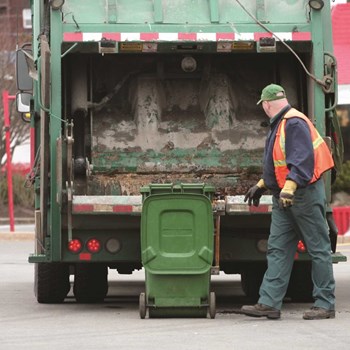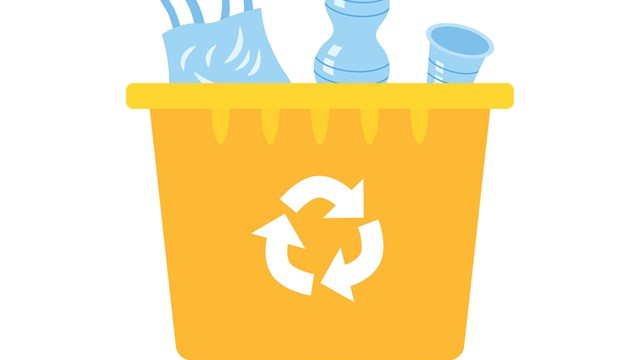
Most people don’t think much about their garbage after they toss it down the chute or into a container for pickup, but the fact is, removing a multifamily community's trash and recyclables can be a big job, especially in a private development not served by municipal or city-run sanitation services. Who picks up the refuse? How frequently it is collected? What gets recycled? These are all concerns that many multifamily residents should consider as factors in both their bottom line and in their community's core services.
Public or Private?
Imagine living in a community where the trash wasn’t hauled away for a few weeks, and you get a good sense of how important waste hauling services are to urban and suburban living. While selecting a dependable waste hauling company is vital to good co-op/condo management, that doesn't mean hiring an outside contractor can't be negotiated in the best interests of the community. And as owners of the community, residents hold the cards in negotiating with service companies who want to do business with them. But the trick is in knowing how to play those cards.
Understanding what a community expects of its waste hauling company versus what the hauler can provide are good starting points for residents to consider when delving into the waste management process. Only after evaluating the community’s needs—as well as other factors, such as budget—can residents determine which waste disposal solutions best fit them.
In New Jersey, most townships either collect their own garbage and recycling, or contract the duties to private companies. Paid for by local property taxes, such contracts tend to reach seven figures, and often span several years. Still, some communities often have other reasons to hire a private waste hauler. Even in those communities that receive their town's waste removal service, some residents opt to hire private haulers to collect garbage that quickly accumulates from move-outs, renovations, evictions and other trash-generating instances. Some townships, like Berkeley Heights have held spring cleanups for residents, which allow them to throw excess trash onto the curb for a one-day pickup. However, recent budget woes have forced townships to eliminate such additional services. And in the last ten years, many New Jersey townships that once ran their own garbage collection have resorted to private carriers in an effort to reduce taxpayer costs.
Several things differentiate public waste removal services from private waste hauling companies, including services offered and pricing. Township or county-run garbage trucks come weekly on a set schedule, with changes in the schedule dependent upon holidays. Private haulers, on the other hand, will pick up garbage from a community or multifamily building as frequently as the building’s management negotiate. That could be two or more times a week, depending upon the building’s needs.
Since garbage collection in New Jersey is done largely through local municipal contracts, a resident or building can't really opt out—everyone has to pay their taxes. But, condos and HOAs are protected by the Municipal Services Act, a state law that requires townships to either provide garbage collection services to condos, or reimburse them for services independently acquired (the same goes for other services like snow removal). “Condo boards should be aware that [the Municipal Services Act] exists, and that they should be receiving reimbursements for those costs on an annual basis,” said Robert Willis, president of TrashPro, a consulting firm that assists buildings and municipalities with trash and recycling contracts. If a building is not getting reimbursed by their township or municipality, the board should contact their local government.
The way counties set up their contracts often makes strict guidelines on how haulers can dispose of the trash, according to Willis. “Every county in New Jersey has different disposal costs. When you are calculating a cost of collection services for a condo, a lot of things go into it. More and more counties are doing what is called “waste flow control,” meaning every bit of trash that's picked up in that county has to go to that county landfill. Therefore, the hauler is obligated to go to that county landfill and pay their price, so they're limited as to what pricing they can give,” says Willis. This dumping expense is called a “tipping fee.”
Bidding & Vetting
As with any maintenance agreement, inking a private waste removal company to serve a community should follow a specific process. That begins with the management company publicizing a request for proposals (RFP) for companies seeking to have a contract to perform waste removal services for the building. Specifications of the length of the contract and general parameters of it are provided in an advertisement for haulers, who respond if interested by sending a proposal outlining what work they will do under the contract and at what price. Condo boards will rarely negotiate with waste companies directly, and for good reason. Ideally, property management companies should take the lead since they often manage other properties. They will be familiar with the available options already, and may have higher purchasing power if they negotiate a contract that involves several buildings. “The best way to do it is to talk to other condo units that have haulers. The management companies have multiple buildings that they're servicing, therefore they would know best if there's a problem with a company,” says Willis.
When responding to an RFP, employees of a contractor will assess the property to research a bid before submitting the proposal. The waste hauling company will want to know how many days a week service will be provided to the building, and if there will be any restraints at the entrance to the building, such as a locked garage that can only be opened by a security guard. Hours of operation issues, and other potential problems such as questions regarding overhead wires or clearance, also will be of interest to a hauler, as will be the question of how much trash the building generates. In other places, the amount of trash would be an important factor in a contract, but because townships are required to reimburse condos at an established rate per household, it's rarely a sticking point.
Board members and other residents of a community should think beyond payment terms and find out how long the company has been in business, and what its overall reputation is. Has it had any problems recently, with authorities or lawsuits? The New Jersey State Department of Environmental Protection (DEP) provides a list on its website of waste collection companies that have violated regulations or had service issues. If condo boards are involved with choosing a company, they should visit the DEP website before entering negotiations with any waste hauler.
It’s also important to check to see that the company’s insurance—be it liability or vehicle insurance—is up to date, as well as its licenses. Haulers in New Jersey must be licensed by the DEP. Up-to-date registration of vehicles with the proper decals also is crucial, and an omission in any of the aforementioned areas should be considered a large red flag. A building or management company should not accept services from a company that is not properly licensed and insured.
Being Green
Some communities have residents with a high interest in environmental issues, and these consumers are interested in lowering their carbon footprint. Some companies, such as the national hauler Waste Management, are now increasingly using cleaner burning, quieter trucks which run on compressed natural gas. These trucks run more efficiently, and many residents appreciate them being used rather than gasoline-fueled trucks, says Bill Plunkett, a spokesman for national waste removal firm Waste Management, which works with more than a dozen waste management companies in New Jersey.
Recycling has become more sophisticated in New Jersey and a larger part of the industry in the last ten years. Municipalities are increasingly including more convenient recycling options for residents. “Single stream” recycling allows residents to make one single pile for recyclables. Newspapers, aluminum cans, and plastic ware get collected together. A new process separates the materials by weight at a nearby plant. According to Guy Watson, the bureau chief of Recycling and Planning for New Jersey's DEP, even though the single stream process requires a little more cost at the back end, it still runs at a third of the price of solid waste collection.
The Municipal Services Act doesn't explicitly require condos to get reimbursed for recycling services, but since waste haulers are often contracted to do both, condos should expect to be reimbursed for recyclables as well. But, each county is different, and how much a county recycles determines whether it's cost efficient. Watson gave an example that an unnamed town in New Jersey was negotiating a contract for recycling, and discovered that the company would charge extra for a recycling service since its residents recycled so little.
“If the residents just doubled the amount it recycled, which would actually be very easy since they recycled so little to begin with, they would in turn save money on their contract,” says Watson.
On the other end of the spectrum, some towns like New Brunswick will withhold reimbursements if your building doesn't recycle enough. “A town can say, 'if your recycling numbers are not at least equal to the town as a whole, we won't reimburse you.' In New Brunswick, the recycling coordinator signs off on some form of approval before the business administrator signs the [reimbursement] check,” says Watson.
Trash and recycling collection for condos are much more cost effective than single family homes. Instead of starting and stopping at every house on the street, trucks can pull up to the building's garage and load trash from just a couple large containers. Since it's shorter and simpler, waste haulers save gas and labor costs. That said, Watson has heard of issues from condo residents. The main issue, he says, is whether a building can provide enough storage for recyclables. “If the site manager or owner addresses that issue of storage, whether that means providing more storage space outside, if you get the space do it. Maybe the frequency of the collection of recyclables is not frequent enough if you don't have the storage containers. From the manger's standpoint, look at that area. Are you making it as convenient as possible for residents to store recycling?”
On top of recycling, a new trend in New Jersey waste collection is “organic separation,” whereby haulers collect food waste and other biodegradable material separately. So far, only Princeton has adopted the practice, but it has already lowered the town's garbage bill because haulers have less garbage to dump in county landfills, which rack up those hefty tipping fees. Instead the organic waste is shipped to a composting facility in Delaware. Despite the transportation cost, it's still cheaper. “Organic separation is really in its nascent stages at this point. But it's going to spread. One thing that will make it spread is when we can get commercial composting facilities in New Jersey. But, it's still cheaper than the equivalent garbage service,” says Watson.
Whether your building or association opts to use a waste hauling company, individual disposal units, or even composting, the key is to remember that there are multiple options for dealing with your community's waste. Hiring a waste removal company is just like hiring any service professional; there's some legwork involved in finding the best fit, and in establishing and maintaining a good working relationship. Choosing the right company or technology can both save money and reduce environmental stress but it's up to your board and management to research the possibilities and make the best choice for your community's needs.
Jonathan Barnes is a freelance writer and a frequent contributor to The New Jersey Cooperator. Editorial Assistant Tom Lisi contributed to this article.






Leave a Comment